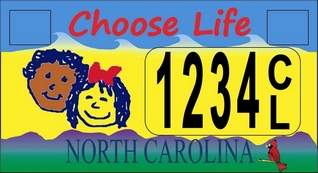North Carolina requires that specialty license plates be authorized by the North Carolina General Assembly. In 2011, the North Carolina General Assembly passed a bill authorizing 70 new licenses plates, creating a total of 150 specialty plates that could be bought by North Carolina residents. Included in this 2011 bill was a “Choose Life” plate.
 The “Choose Life” plates would cost an additional $25.00, with $15.00 of that to go to the Carolina Pregnancy Care Fellowship. Under the Fellowship’s guidelines, funds are “expressly prohibited from ‘be[ing] distributed to any agency, organization, business, or other entity that provides, promotes, counsels, or refers to abortions.’”
The “Choose Life” plates would cost an additional $25.00, with $15.00 of that to go to the Carolina Pregnancy Care Fellowship. Under the Fellowship’s guidelines, funds are “expressly prohibited from ‘be[ing] distributed to any agency, organization, business, or other entity that provides, promotes, counsels, or refers to abortions.’”
At the same time the “Choose Life” plate was being considered, a “Respect Choice” or “Trust Women. Respect Choice” plate was proposed. But it was rejected each time it was brought up.
The American Civil Liberties Union (ACLU) brought a lawsuit alleging that “the State has opened a state-created forum for private speech to one viewpoint alone in the public debate over abortion.” The lawsuit claimed that allowing “Choose Life” without a “Respect Choice” option violated the First Amendment right to freedom of speech.
Judge Fox was the judge for the Eastern District of North Carolina to rule on this case, and he found on Friday that the “Choose Life” plates were unconstitutional.
The judge spent considerable time discussing whether this was government speech, private speech, or hybrid speech, each of which carries with it different regulations. Different types of speech carry different rules regarding what is required for a violation of the First Amendment, with purely government speech having the strictest rules.
Finding that the “Choose Life” license plates are not purely government speech, the court looked at the law’s purpose, the editorial control, and who bears the responsibility for the speech.
First, with regard to the “purpose” of the relevant law at issue, common sense dictates that it is to allow North Carolina drivers to express their affinity for various special interests…. To state that the purpose of the relevant statute was to express that State’s message of supporting the idea of choosing life over abortion is to ignore the larger governmental specialty license plate program as a whole.
…
With regard to editorial control, it is undisputed that the State exercises complete editorial control over the Choose Life plates, even if the idea for the plate may have originated with the national Choose Life organization.
South Carolina considered the same issue in 2004, with Judge Michael writing:
Although the Choose Life plate was made available through state initiative, the private individual chooses to spend additional money to obtain the plate and to display its pro-life message on her vehicle.
And so, on page 20 of a 21-page decision, the Court decided that the North Carolina “Choose Life” plates were “at bottom, a government-sponsored avenue to encourage private speech.”
With that, the Court simply stated:
This court also concludes, as did each of the judges in Rose [the South Carolina Case], that the State’s offering of a Choose Life license plate in the absence of a pro-choice plate constitutes viewpoint discrimination in violation of the First Amendment.
And so, “Choose Life” license plates are now unconstitutional in North Carolina.







